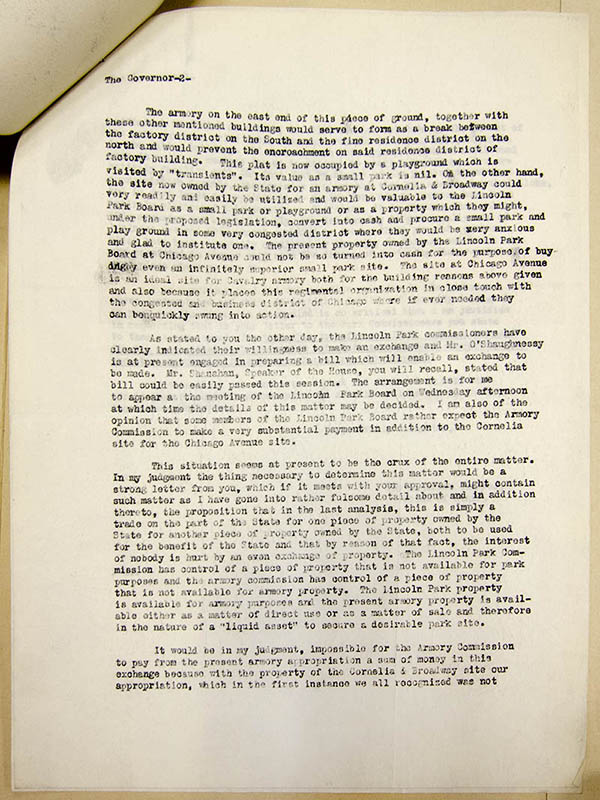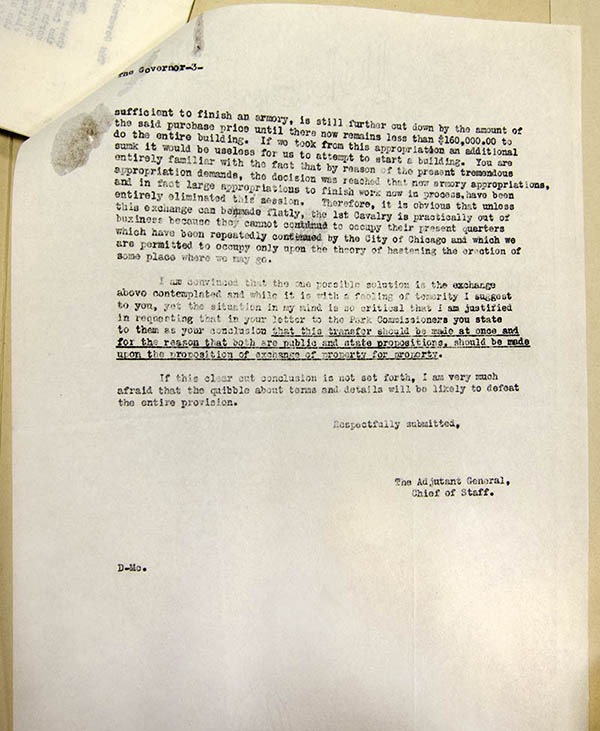The three page letter, below, presented by permission and courtesy of the Chicago Park District Special Collections is dated May 10, 1915, and is transcribed on the right. The missive is a plea from Adjutant General Frank S. Dickson to Illinois Governor Edward F. Dunne, asking for consideration a land swap: the corner of Broadway and Cornelia Streets for a parcel just east of the Pumping Station, adjacent to Lake Shore Park.
General Dickson argues that the current open ground would be improved by the presence of an armory: "This plat is now occupied by a playground which is visited by “transients”. Its value as a small park is nil."
Further, in asking Governor Dunne to write a "strong letter," and re-iterating that the Lincoln Park Commissioners have agreed to the swap, Dickson states: "this is simply a trade on the part of the State for one piece of property owned by the State for another piece of property owned by the State, both to be used for the benefit of the State and that by reason of that fact, the interest of nobody is hurt by an even exchange of property."


 |
The Governor: -
In consonance with your suggestion that I submit to you in a general way, data which I would recommend be incorporated in your letter to the Lincoln Park Commissioners, to be presented by me at the meeting on Wednesday, I submit the following:
48th General Assembly appropriated $225,000.00 for the securement of site and the erection of an armory for the 1st Cavalry regiment. It was known at the time that this amount would not be sufficient to procure a site and put up an entirely suitable armory, but the view of appropriations in general and of other armory appropriations in particular, the above amount was all that could be consistently given. The Commanding Officer, 1st Cavalry, stated that he would, from outside sources, raise sufficient money to complete proper building. In consonance with this legislation the Armory Commission purchased a site at Cornelia & Broadway, paying therefor the sum of $63,250.00. It later developed that this site being in more or less congested district and met with serious opposition on the part of residences contiguous thereto as the site for the erection of a Cavalry armory building, it became apparent that to attempt to put an armory on this site would mean, to say the least, interminable delay and bitter litigation. The Armory Commission in cooperation with Your Excellency, then cast about for a solution of the difficulty and a possible site in Lincoln Park was discussed but it was found both by interviews with the newspaper editors in Chicago and subsequently by letters of protest, that this project was not feasible as there seemed to be a serious objection to the placing in Lincoln Park proper buildings that were not specifically designed and intended for the purposes of enjoyment of this Park. At this stage Mr. Winston of the Park Commission, suggested a possible solution and in consonance with that suggestion, your Excellency visited the new proposed site in company with Mr. Winston, Colonel Foreman and myself, and personally acquainted yourself with the situation. The Lincoln Park commissioners have at the intersection of Chicago Avenue and Lake Shore Drive, a strip of ground acquired by them not for park purposes, but as I understand, for the purpose of opening certain streets and as a result of riparian rights. To the south of this site the ground is vacant for approximately a block, where there is found a number of factory buildings. In fact, to the south nothing but factories and these adjacent to the Chicago River. To the north, no buildings for approximately one and one-half blocks when there begins expensive and exclusive apartment buildings. The west end of this plat of ground s occupied by the water works of the City of Chicago, immediately beside this, a fire department and on the north 400 feet east, owned by the City, there is contemplated to put drill hall for Mounted Police.
The Governor -2-
The armory on the east end of this piece of ground, together with these other mentioned buildings would serve to form as a break between the factory district on the South and the fine residence district on the north and would prevent the encroachment on said residence district of factory building. This plat is now occupied by a playground which is visited by “transients”. Its value as a small park is nil. On the other hand, the site now owned by the State for an armory at Cornelia & Broadway could very readily and easily be utilized and would be valuable to the Lincoln Park Board as a small park or playground or as a property which they might, under the proposed legislation, convert into cash and procure a small park and play ground in some very congested district where they would be very anxious and glad to institute one. The present property owned by the Lincoln Park Board at Chicago Avenue could not be so turned into cash for the purpose of buying even an infinitely superior small park site. The site at Chicago Avenue is an ideal site for Cavalry armory both for the building reasons above given and also because it places this regimental organization in close touch with the congested and business district of Chicago where if ever needed they can be quickly swung into action.
As stated to you the other day, the Lincoln Park commissioners have clearly indicated their willingness to make an exchange and Mr. O’Shoughnessy is at present engaged in preparing a bill which will enable an exchange to be made. Mr. Shanahan Speaker of the House, you will recall, stated that bill could be easily passed this session. The arrangement is for me to appear at the meeting of the Lincoln Park Board on Wednesday afternoon at which time the details of this matter may be decided. I am also of the opinion that some members of the Lincoln Park Board rather expect the Armory Commission to make a very substantial payment in addition to the Cornelia site for the Chicago Avenue site.
This situation seems at present to be the crux of the entire matter. In my judgment the thing necessary to determine this matter would be a strong letter form you, which if it meets with your approval, might contain such matter as I have gone into rather fulsome detail about and in addition thereto, the proposition that in the last analysis, this is simply a trade on the part of the State for one piece of property owned by the State for another piece of property owned by the State, both to be used for the benefit of the State and that by reason of that fact, the interest of nobody is hurt by an even exchange of property. The Lincoln Park Commission has control of a piece of property that is not available for park purposes and the armory commission has control of a piece of property that is not available for armory property. The Lincoln Park property is available for armory purposes and the present armory property is available either as a matter of direct use or as a matter of sale and therefore in the nature of a “liquid asset” to secure a desirable park site.
It would be in my judgment, impossible for the Armory Commission to pay from the present armory appropriation a sum of money in this exchange because with the property of the Cornelia & Broadway site our appropriation, which in the first instance we all recognized was not
The Governor -3-
Sufficient to finish an armory, is still further cut down by the amount of the said purchase price until there now remains less than $160,000.00 to do the entire building. If we took from this appropriation an additional sum it would be useless for us to attempt to start a building. You are entirely familiar with the fact that by reason of the present tremendous appropriation demands, the decision was reached that new armory appropriations and in fact large appropriations to finish work now in process, have been entirely eliminated this session. Therefore, it is obvious that unless this exchange can be made flatly, the 1st Cavalry is practically out of business because they cannot continue to occupy their present quarters which have been repeatedly condemned by the City of Chicago and which we are permitted to occupy only upon the theory of hastening the erection of some place where we may go.
I am convinced that the one possible solution is the exchange above contemplated and while it is with a feeling of temerity I suggest to you, yet the situation in my mind is so critical that I am justified in requesting that in your letter to the Park Commissioners you state to them as your conclusion that this transfer should be made at once and for the reason that both are public and state propositions, should be made upon the proposition of exchange of property for property.
If this clear cut conclusion is not set forth, I am very much afraid that the quibble about terms and details will be likely to defeat the entire provision.
Respectfully submitted,
The Adjutant General,
Chief of Staff.
|